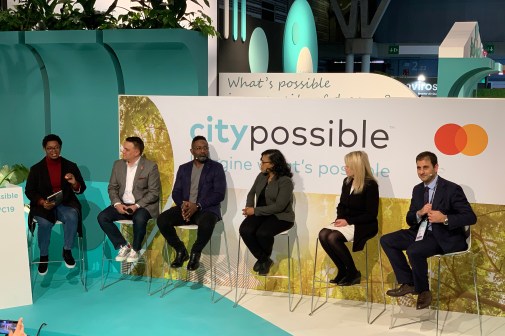On the IoT frontlines, cities should embrace culture over tech

WASHINGTON, D.C. — Becoming a “smart” city is about much more than implementing effective Internet of Things and data analytics technologies, public sector experts said Wednesday.
Archana Vemulapalli, the chief technology officer for Washington, D.C., said the district is looking at multiple technologies to make the city smarter — from streetlights to sensors to preparing for autonomous vehicles. Despite that, Vemulapalli said the main focus of her team’s smart cities effort centers around people and how to keep them engaged in using technology to improve communities.
“It’s all about people, and the way you get to people is by setting up the right governance,” she said. “We need a horizontal group that pulls from operational expertise and looks across the cross section. Now, when we’re looking at deploying any capability, we’re not just looking at how it helps traffic, we’re looking across boundaries. That’s the fun part of what we’re doing.”
David Graham, the deputy chief operating officer for San Diego, agreed, saying the culture change around collaboration was his biggest challenge.
“Each department thinks about solving a problem and putting resources to that,” Graham said. “I think the single biggest challenge is changing the mindset of departments from these one-off solutions for particular problems to a platform.”
In the state of Illinois, CIO Hardik Bhatt has embarked on an effort to become the first “smart state” — and he’s pulling together the horizontal team by assembling the state’s new Department of Innovation and Technology. With that in place, his challenge is neither the technology nor the culture but rather keeping state regulations and policies up to date to enable new technologies to come into play.
“We’ve brought the business together,” Bhatt said. “How do they keep pace with all the technology changes or new technology that is coming in with all the regulations that we need to change retroactively?”
Seattle Chief Technology Officer Michael Mattmiller said without governance and people driving smart, efficient decision-making, smart city technology isn’t always a good thing.
“When we look at a city-owned utility pole with eight different weather systems on it all reporting to different places, that is a dumb smart city,” Mattmiller said. “It doesn’t help anyone to start picking off departments with one-off solutions. It needs to be on platforms, it needs to all work together.”
In addition to a strong governance framework, the future of smart city development will also depend on a more robust effort by city governments, industry and academia to work together to study actual applications, according to a panel of federal experts at the conference.
Jim Kurose, the National Science Foundation’s assistant director for computer and information science, said that going forward, those supporting smart cities “need to focus on interdisciplinary and integrated research.” That research is something NSF has put a premium on — the group has allocated $25 million to invest in smart cities for 2017.
But “ivory tower” research isn’t the right approach for smart cities development, Kurose said. Instead, successful smart city planners will pull together computer scientists, engineers, social and economic scientists, geoscientists, and others to test and learn from the emerging technology applications coming out of smart cities.
Tom Kalil, the deputy director for policy at the White House’s Office of Science and Technology Policy, said cities are on the front lines of finding solutions — specifically around sustainability — that can be aided through smart city technology.
Those solutions should get some fresh support with an announcement Monday from the White House investing more than $80 million in smart city initiatives.
Scoop News Group’s Wyatt Kash contributed to this report.






